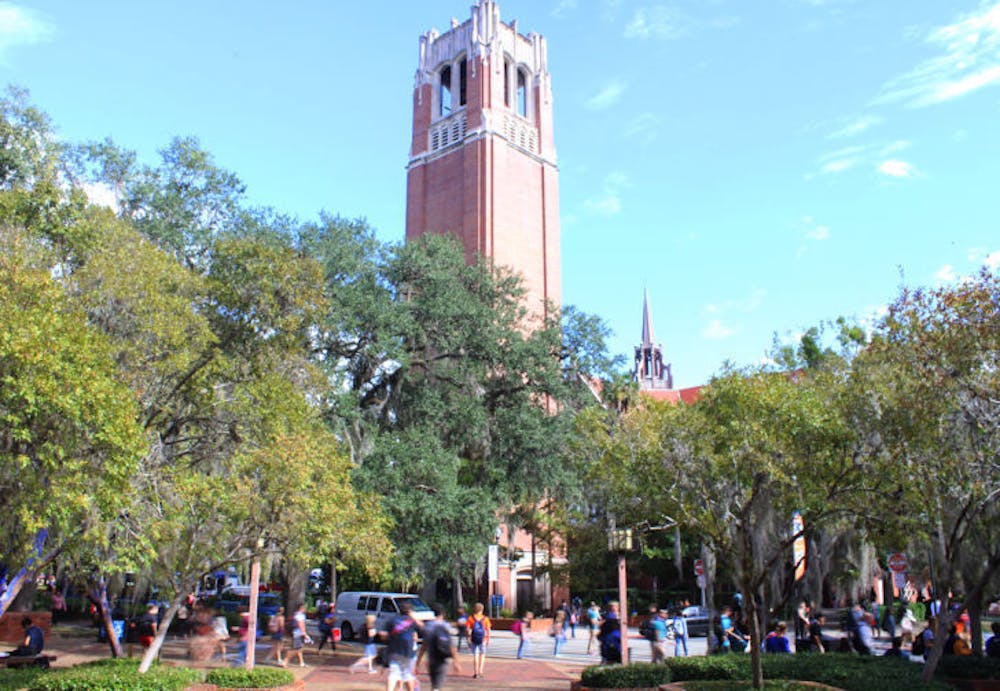Update: This story has been updated to reflect the announcement Fuchs released in an email about reversing UF’s previous decision to bar the three professors from testifying.
In a mass email sent Friday afternoon, Fuchs announced he would ask UF’s Conflicts of Interest Office to reverse the decision to block the professors from testifying. He also requested that the professors be allowed to receive compensation for their expert testimonies.
After at least eight professors claimed UF compromised their academic freedom and freedom of speech, President Kent Fuchs and Provost Joe Glover appointed a special task force to investigate the university’s conflict of interest policy, which was used to bar the professors from testifying.
The task force consists of three faculty members; Katie Vogel Anderson, John Kraft and Clay Calvert; two deans, Hub Brown and Laura Rosenbury; and one staff member, Terra DuBois.
Fuchs announced their names during the UF Faculty Senate Steering Committee meeting Thursday evening, in which the Senate discussed courses of action to be taken to resolve the turmoil between the university and the professors.
“It’s too bad the institution is going through this; it’s not anybody’s fault as far as I can tell,” Fuchs said. “Everyone is doing what they think is right for higher ed[ucation].”
Regardless of who to blame, the damage has been done, said Kenneth Nunn, one of the five professors that most recently came forward.
“It’s unfortunate that it had to be done in the first place, that there wasn’t somebody smart enough to look at this situation and say ‘you know, that is going to harm the university if we do that,” the UF law professor said.
UF law professors objected to the new conflict of interest policy in January 2020 that required professors to submit reports for approval before engaging in outside work. They were concerned it was going to be used as a prior restraint on speech, Nunn said. Although they were told the new policy had nothing to do with this, the law professors still held suspicions — which were justified by current events, he said.
Although the university’s actions have caused friction, the professors still hold the school in high regard.
“I love the University of Florida; I’ve committed 30 years of my career to the university,” said Jeffrey Goldhagen, one of the five recent professors to come forward.
This is not about a conflict with the university; it is about academic freedom, first amendment rights and the profoundly important role that universities play in our society, the professor and pediatrician said.
Goldhagen believes this denial of intellectual freedom is a violation of the validity and integrity of the university, faculty and student body.
Recognizing there is an impact on students, departments have started sending emails to the Student Body to address the situation at hand.
“There will be much said about the present moment, but our commitment to preparing our students with a firm foundation in free speech, and our commitment to the academic freedom that supports our teaching and research, will never change,” Hub Brown, the dean of UF’s College of Journalism and Communications, wrote in yesterday’s email statement.
The national conversation about the limitations on professors’ speech was a priority in the meeting.
Fuchs addressed it for the first time since news reports came out.
“I thought I would focus my comments just very simply on the obvious issue of academic freedom and freedom of speech and where we are and where I hope we’ll be tomorrow, and where I hope we’ll be in two weeks,” he said.
He alluded to a future announcement that he said would not be appropriate to make at this time.
Contact Elena Barrera at ebarrera@alligator.org. Follow her on Twitter @elenabarreraaa

Elena is a second-year journalism major with a minor in health sciences. She is currently the University Administration reporter for The Alligator. When she is not writing, Elena loves to work out, go to the beach and spend time with her friends and family.






